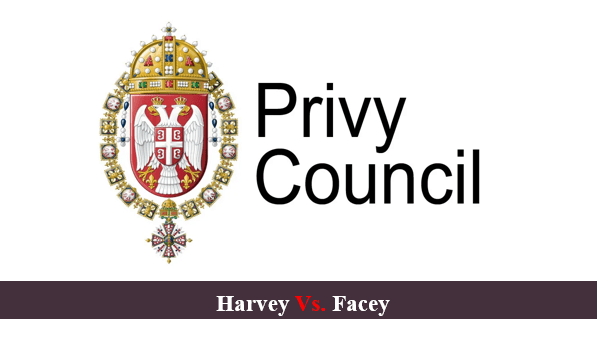
| Citation | (1893) AC 552 |
| Date of Judgment | July 7, 1893 |
| Court | Privy Council |
| Case Type | Contract law case |
| Appellant | Mr. Harvey |
| Respondent | Mr. Facey |
| Bench | The Lord Chancellor, Lord Watson, Lord Hobhouse, Lord McNaughton, Lord Morris [Delivery of the Judgement], Lord Shand |
Introduction:
Harvey Vs Facey is an important case law in Law of Contracts. It explains the difference between providing information and making an offer. It is an example when quoting a price of something is not construed to be an offer. It also throws light upon the difference between an invitation to offer and an offer.
Facts:
The appellant, Mr. Harvey was running a partnership business in Jamica. He wanted to purchase a property owned by Mr. Facey also known as the “Bumper Hall Pen”. Mr. Facey was also in negotiation with the Mayor and Council of Kind of Kingston City at the same time for the above-mentioned property.
Mr. Harvey sent a telegram to Mr. Facey regarding the purchase of the property on 6th October 1893. The telegram read:
Telegram 1- “Will you sell us Bumper Hall Pen? Telegraph lowest cash prize- answer paid.”
After reading this, Mr. Facey replied:
Telegram 2- “Lowest price for Bumper Hall Pen is £900.”
The next day the appellant replied:
Telegram 3- “We agree to buy Bumper Hall Pen for a sum of £900. Please send us your title deed in order so that we may get early possession.”
On receiving the telegram, Mr. Facey chose not to reply to the same and later he refused to sell the property to the appellant, reason being that he did not promise to sell the property to the appellant.
This resulted in a displeased Mr. Harvey deciding to sue Mr. Facey, claiming that the response given by him in Telegram 3 was an acceptance to the offer made by Mr. Facey in Telegram 2. Hence, he was bound by law to sell the property to Mr. Harvey.
Lord Curren dismissed this petition on the first trial on grounds that “The agreement as alleged by the Appellant did not denote a concluded contract”
Issues:
- If there was an explicit offer from Facey to Harvey to sell the Bumper Hall Pen for £900.
- If there existed a valid contract.
Judgement:
After reviewing the entire matter carefully, the Hon’ble Court upheld the verdict of Justice Curren. The court held that in the first telegram, the appellant had two questions, one was if the respondent was willing to sell Bumper Hall Pen and second was the minimum price for the property.
But the reply was only given for the second question by the respondent quoting the price for the property to be £900. But it was visible that there was a lack of willingness to sell his property to Mr. Harvey. Therefore, it cannot be assumed that the reply given in telegram 2 was an offer by the respondent.
Hence, due to the non-existence of a proper offer the acceptance in telegram 3 is inconsequential. The opinion of the Lordships was that even if there was a contention by the appellants that there was presence of an implied offer, only the quotation of the lowest price of the land which was communicated by the respondent doesn’t satisfy the requisites of an implied contract.
Conclusion:
This case became a landmark case in laying down the foundation of “invitation to offer”, for example in situations where the price of a product for sale is displayed, it doesn’t constitute an offer if the seller has not expressed his intention to do the same.
A valid contract requires an offer as well as an acceptance. And for the contract to be binding it is necessary that the offer and acceptance are communicated. A mere statement does not constitute an offer. This is because a legally enforceable contract requires certainty to hold.
References:
- https://www.simplekanoon.com/contract-law/harvey-vs-facey-621/
- https://www.legalserviceindia.com/legal/article-6532-case-harvey-v-s-facey.html
- https://www.thelawstudies.org/2020/04/invitation-to-offer.html
Written by Mehek Sharma an intern under legal vidhiya.




0 Comments